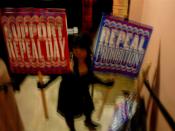INTRODUCTION
Presumption as defined in black's law dictionary as a legal inference or assumption that a fact exists, based on the known or proven existence of some other facts or group of facts. Most presumptions are rules of evidence falling for a certain result in a given case unless the adversely affected party overcomes it with other evidence. A presumption shifts the burden of production or persuasion to the opposing party, who can then attempt to overcome the presumption.
William P. Richardson in his book on 'The Law of Evidence' defines presumption to be an inference as to the existence of one fact from the existence of some other fact founded upon a previous experience of their connection.
Repeal has been defined as an abrogation of an existing law by legislative act. Repeal has been divided into two by eminent jurists as expressed repeal and implied repeal. The former is a repeal affected by specific declaration in a new statute.
While the latter, is a repeal affected by irreconcilable conflict between an old law and a new law. This is also termed as repeal by implication.
The doctrine of implied repeal is based on the theory that the legislature, which is presumed to know the existing law, did not intend to create any confusion by retaining conflicting provisions and, therefore, when the courts applies the doctrine, it does no more than give effect to the intention of the legislature by examining the scope and the object of their provisions.
In a landmark case on this doctrine of implied repeal, Municipal Council, Palai v. T.J. Joseph , the Hon'ble court had laid down that, there is a presumption against a repeal by implication; and the reason of this rule is based on the theory that the legislature while enacting a law...



Please
suggestions please
2 out of 2 people found this comment useful.